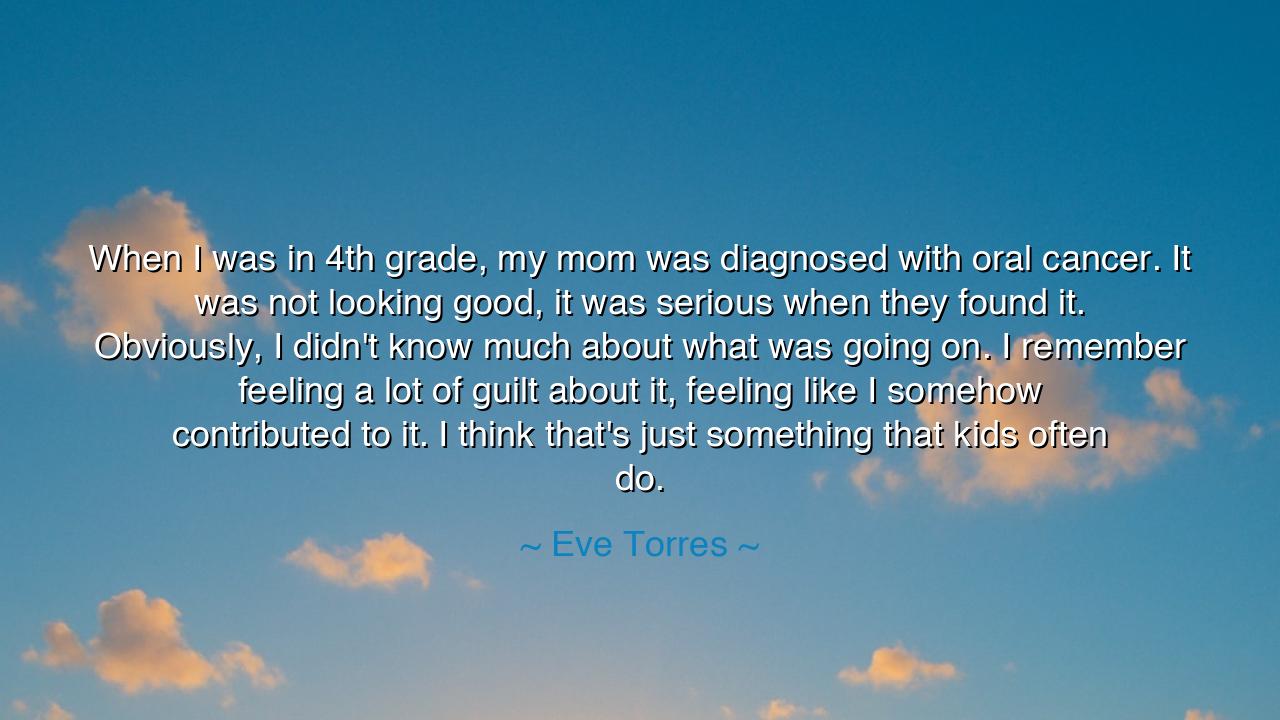
When I was in 4th grade, my mom was diagnosed with oral cancer.
When I was in 4th grade, my mom was diagnosed with oral cancer. It was not looking good, it was serious when they found it. Obviously, I didn't know much about what was going on. I remember feeling a lot of guilt about it, feeling like I somehow contributed to it. I think that's just something that kids often do.






Hear the tender and sorrowful words of Eve Torres, who speaks of the trials of childhood when shadow fell upon her home: “When I was in 4th grade, my mom was diagnosed with oral cancer. It was not looking good, it was serious when they found it. Obviously, I didn’t know much about what was going on. I remember feeling a lot of guilt about it, feeling like I somehow contributed to it. I think that’s just something that kids often do.” In this reflection lies the voice of innocence confronted with suffering too vast for young shoulders to bear, and the misdirection of blame that so often grows in the hearts of children when those they love fall into illness.
The meaning of her words is layered in pain and recognition. A child does not yet understand the nature of disease, nor the random cruelty by which it sometimes strikes. In the absence of understanding, the child turns inward, imagining that their own actions, their mistakes, or even their very existence have somehow invited the tragedy. This misplaced guilt is not rational, but it is deeply human, born of the longing for control in a world that feels suddenly broken.
The ancients, too, knew this. In the tragedies of Greece, when plague or famine struck, it was often the youngest, the most innocent, who bore the cries of blame. In Oedipus Rex, a people believe their suffering must be caused by hidden sin, by some fault within themselves. Likewise, children, in their purity, believe calamity must somehow spring from their own hidden wrongs. Yet the truth is harsher: life is not always fair, and pain comes without reason. To see this truth and release oneself from false guilt is one of the great lessons of growing into wisdom.
Consider also the story of Franklin Delano Roosevelt, who in his prime was struck by polio. His children, still young, watched their father’s strength falter. In their innocence, some wondered if they had burdened him too greatly, if their needs had weakened him. But in time they learned what Torres too came to understand—that illness is not the fault of the child, nor the family, but the mystery of fate. What matters is not the guilt that we falsely assume, but the courage and unity we bring to the one who suffers.
Torres’ words remind us of the sacred role of family in times of trial. When a mother falls ill, it is not only her body that bears the weight, but the hearts of all her children. The child feels helpless, desperate to do something, yet too young to understand. This helplessness often hardens into guilt. But if rightly guided, it can also become the soil of compassion, teaching the child to care deeply for others, to carry empathy into the world as a torch.
The lesson, O seeker, is clear: we must teach our children that suffering does not always have a cause that lies within them. They must know that cancer, illness, and pain are not punishments but battles of the body, and that their role is not to carry blame but to offer love. For love heals where guilt only corrodes. When children are taught this truth, they are freed from invisible chains and strengthened to stand beside their loved ones with courage.
Practical is this counsel: when hardship comes, speak honestly with children. Do not shroud them in silence, for silence breeds guilt. Explain in words they can understand, assure them that they are not to blame, and invite them to be part of the healing through simple acts of kindness and presence. In doing so, you transform despair into unity, and guilt into love.
Thus, the words of Eve Torres resound across generations: “I remember feeling a lot of guilt about it… I think that’s just something kids often do.” Let us take them as both warning and wisdom. Let us not allow innocence to become burdened by shadows it cannot carry. Instead, let us lift those shadows with truth, with compassion, and with the teaching that love, not guilt, is the true response to suffering. In this way, children grow not into broken souls, but into healers of the world.






AAdministratorAdministrator
Welcome, honored guests. Please leave a comment, we will respond soon